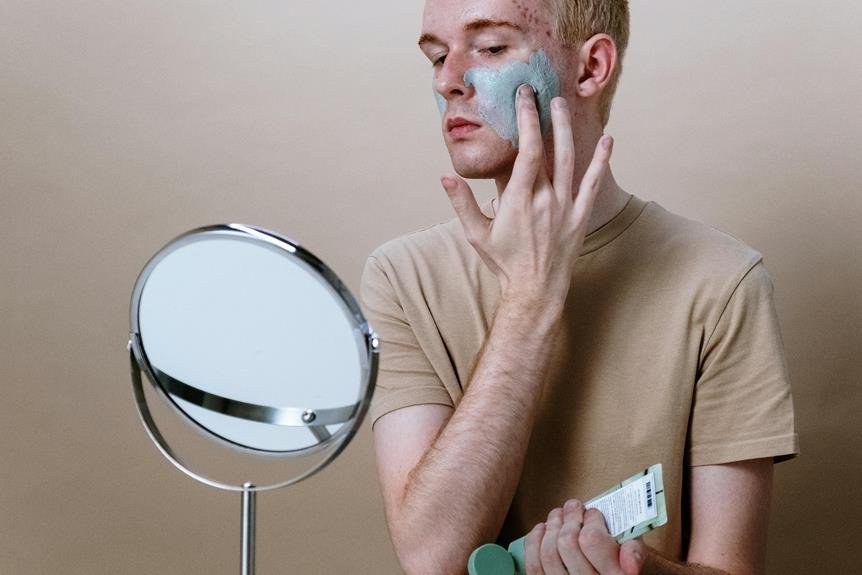
To effectively address acne-prone skin, selecting the appropriate skincare products plays a vital role in maintaining a clear complexion. Ensuring that your products are tailored to your skin's needs and concerns can significantly impact the overall health of your skin. By understanding the key ingredients to look for and incorporating a consistent routine, you can take proactive steps to manage acne and promote healthy skin. But what specific tips and product recommendations can help you navigate the world of acne skincare effectively?
Understanding Acne-Causing Ingredients
When dealing with acne-prone skin, understanding which ingredients can potentially cause breakouts is crucial. Certain ingredients in skincare products can exacerbate acne by clogging pores or irritating the skin. One common culprit is mineral oil, which is known to be comedogenic and can lead to pesky breakouts. Another ingredient to watch out for is coconut oil, as its high level of oleic acid can trigger acne flare-ups in some individuals.
Additionally, products containing alcohol can strip the skin of its natural oils, causing it to produce more sebum and potentially leading to more breakouts. Fragrances and artificial dyes are also known to be irritating to sensitive skin types, potentially worsening acne symptoms. When selecting skincare products, opt for non-comedogenic, oil-free, and fragrance-free options to minimize the risk of triggering breakouts.
Being mindful of these acne-causing ingredients can help you make informed choices when it comes to your skincare routine and prevent unnecessary flare-ups.
Daily Skincare Routine Tips
For a healthy complexion, incorporate these daily skincare routine tips to maintain clear and radiant skin. Start your day by cleansing your face with a gentle, acne-fighting cleanser to remove excess oil and impurities. Follow up with a lightweight, oil-free moisturizer to keep your skin hydrated without clogging pores. Throughout the day, avoid touching your face to prevent transferring bacteria and oils from your hands. If you wear makeup, choose non-comedogenic products to reduce the risk of breakouts.
In the evening, double cleanse by first removing makeup with a gentle remover and then washing your face with a cleanser suitable for acne-prone skin. Exfoliate 2-3 times a week to unclog pores and remove dead skin cells. After cleansing, apply a spot treatment containing benzoyl peroxide or salicylic acid to target any active breakouts. Finish your routine by moisturizing to keep your skin balanced and healthy.
Remember to drink plenty of water, eat a balanced diet, and get enough sleep to support your skin's overall health. By following these simple daily skincare tips, you can help prevent and treat acne-prone skin effectively.
Best Products for Acne-Prone Skin
To effectively address acne-prone skin, selecting the right products tailored to your specific needs is key. Look for products labeled as non-comedogenic, which means they won't clog your pores. Cleansers with salicylic acid or benzoyl peroxide can help target acne-causing bacteria and unclog pores.
Lightweight, oil-free moisturizers will hydrate your skin without exacerbating breakouts. Incorporating a gentle exfoliator containing ingredients like glycolic acid or lactic acid can help remove dead skin cells, preventing them from clogging pores and causing acne.
When choosing a sunscreen, opt for oil-free formulas to avoid pore blockage. Spot treatments with sulfur or tea tree oil can be useful for targeting individual blemishes. Additionally, incorporating a clay mask into your routine once or twice a week can help absorb excess oil and impurities from the skin.
Advanced Treatment Options
Consider exploring advanced treatment options such as professional chemical peels or laser therapy to target stubborn acne and improve skin texture and tone. Professional chemical peels are effective in removing dead skin cells, unclogging pores, and reducing acne scars. They work by applying a chemical solution to the skin, causing it to exfoliate and eventually peel off, revealing smoother and clearer skin underneath.
Laser therapy, on the other hand, uses focused light to target and kill acne-causing bacteria, reduce inflammation, and stimulate collagen production for improved skin texture.
These advanced treatments can be particularly beneficial for individuals with severe or persistent acne that hasn't responded well to over-the-counter products. Professional guidance is essential when considering these treatments to ensure they're tailored to your skin type and concerns. While these treatments can yield significant improvements, they may also have associated risks and downtime, so it's crucial to consult with a dermatologist or skincare professional before proceeding.
Advanced treatment options offer targeted solutions for stubborn acne issues and can help you achieve smoother, clearer skin over time.




